71 Political Fandom of #DougFordIsCorrupt
Stephanie Pajares
Platforms are a place where many individuals can share their ideas and feelings about an issue. This is where online communities can be built, there are groups of people who collectively come together on a platform to share knowledge, skills and find a connection with other people. Platforms like X is an easy and convenient way to connect to other like-minded individuals who have the same emotional reaction towards something. This connection can be linked by hashtags. Hashtags can also be used by individuals to see what is trending, which is considered hegemonic ideas, which some individuals try to go against. When it comes to politicians there are always individuals or groups of people who are consistently looking out to see how the party or individual in a party will falter. This can include opposition party leaders, news outlet or individuals from the public. This essay will focus on individuals from the public who have a reactionary response to a specific person from the conservative government. The main reason for a reactionary response from the public is based on affect. Affect is an emotional connection towards a meaning, cause or text that motivates individuals to either be part of a community or create affective labour about an issue that they connect with and have an emotional attachment. Doug Ford, a prominent political figure, has been a catalyst for mobilizing individuals into the craft market. This essay delves into the reactionary fandom surrounding Doug Ford’s main scandals from September 1, 2023, to December 08, 2023, with a particular emphasis on the emergence of anti-fans using the hashtag #DougFordisCorrupt. By examining the dynamics of anti-fandom, instances of political poaching, and the resulting textual productivity, this essay aims to demonstrate how the collective negative sentiment towards Doug Ford can give rise to fan-entrepreneurship.
Doug Ford is the brother of Rob Ford, Rob Ford shot to politician stardom before his death due to an infamous video of him doing crack. Due to this video Rob Ford became famous around the world, especially in America “Politicians and leaders are represented on multimedia platforms in a very similar way to celebrities. Online, mediated political texts are accessed, commented on, reposted, and repurposed, creating intimate relationships between politicians and the public” (Rodrigues, 69) this celebrity statues radiated towards Doug Ford since he was the brother. Doug Ford rode on his brother’s famous wagon. He used it to create a twitter page (now called X) called @FordNation which was used to describe Rob Ford fans before he died. These fans that loved Rob Ford moved to support Doug Ford. News outlets recognized this emotional connection and the connection to Ford Nation; “This urge to be passionate about seemingly meaningless things is ingrained in most of us, and in our current consumer society we are encouraged to “follow our dreams,” “try new things” and “experience life fully”—to be good consumers. Fans are, due to their strong relationship with their object of fandom, potentially good consumers. It is therefore not surprising that brands and organizations want to create fans—and that media producers want to get the most out of their fans to generate maximum profits.” (Linden, 22) this connection to a phrase created an affect connection to Doug Ford, which amassed many fans for him, that were loyal. When there are masses of fans there are also groups of people or individuals who do not, and who hate Ford Nation fans and Doug Ford himself. This is an example of fandom where weather it is anti-fandom or regular fandom everyone is a fan of something “In fact, everyone is constantly a fan of various sorts of things, for one cannot exist in a world where nothing matters (including the fact that nothing matters). In fact, I think that what we today describe as a ‘fan’ is the contemporary articulation of a necessary relationship which has historically constituted the popular, involving relationships to such diverse things as labor, religion, morality and politics. Thus, there is no necessary reason why the fan relationship is located primarily in the terrain of commercial popular culture.” (Linden, 22) This quote explains that everyone can be a fan of anything and it does not need to part of a hegemonic group, it can be the opposite or something completely different. The subgroup that was created by hate towards Doug Ford created a hashtag #Fordiscorrupt. These anti-fans locked on to this political figure “we all have our own personal bad objects, but here I refer to popular bad objects. In simple cases, they may be based on a widespread agreement—whether moral, aesthetic, affective, or political—about what is inappropriate in the media world. But we should also expect that bad object anti-fandoms are coalitional and intersectional, as the object finds itself at the crossroads of multiple types of anti-fandom” (Dean 2017) this means that anti-fandom is based on case by case. It does not need to be Doug Ford himself it could be the policy that he tries to push through which can create anti-fans or a combination. Recently Doug Ford got into some hot water with two major incidents. The first involved the Green Belt in Ontario and the second one involved two places, Ontario place and the Science Center. These two issues increased his media presence in a negative way and created more hate towards Doug Ford, “Hate or dislike of a text can be just as powerful as can a strong and admiring, affective relationship with a text, and they can produce just as much activity, identification, meaning, and effects: or serve just a powerfully to unite and sustain a community or subculture.” (841, Henrik) the two issues increased the negative affect towards Doug Ford on X and supported the subculture. The hate texts that were posted showed affective labour that is being used like in Appendix A. This creativity comes from a negative affect “communication is better understood through the negativity of drive, a negativity that results in stuckness and movement, rupture and creativity, a negativity, in other words, capable of accounting for the reflexivity in real networks (negativity here connotes positive feedback and the excess of an effect in relation to its cause)” (Dean, 98) the negative labour text shown on #DougFordIsCorrupt demonstrated how quickly a negative response can be placed on X. These two scandals increased a reactionary action towards Doug Ford and his party. These reactionary texts and political poaching are produced due to affect towards the two issues and the addition negative affect towards Doug Ford. In Appendix B shows an individuals who regularly posts pictures of nature and wildlife with a caption that has a negative connotation towards Doug Ford, Appendix C. This individual connects to the Green Belt issue because he is a wildlife photographer. Therefore, his affect becomes politically charged and produces political and nature poaching which contributes into the #DougFordIsCorrupt.
The more individuals connect to the subculture of anti-fans towards Doug Ford the more individuals will produce and create a community. This production on X demonstrates politically charged poaching. Political poaching is when individuals, who use pictures that can be of the politician or a picture that is supposed to represent the politician or party, overlay it with text that represents a meaning that is either positive or negative. Appendix D to Appendix F are all anti- fan productions of political poaching, that deals with the hashtag #DougFordIsCorrupt. Many of these pictures and text are shared around and sent directly to @FordNation which is Doug Fords X account. This means that Doug Ford and whoever is in charge of his account is aware of the anti-fan sentiment towards him and the current issues. This online collective of individuals who create political poaching of Doug Ford, could be considered as civic fandom since they are directly communicating with Doug Ford and making their opinions known to create a change in policy, Appendix G is a good example of political poaching by an anti-fan. Appendix H is a classic example of Civic fandom, to get other individuals to participate in the hashtag #DougFordIsCorrupt. In September Doug Ford reversed the green belt construction, on his own initiative, but there were many individuals who protested before that, and he was also being investigated due to the green belt construction. The combination of negative press, investigation by the auditor general, anti-fans that were physically protesting and anti-fans that were sharing negative political poaching pictures and text online, created change and forced Doug Ford to change his statement about the green belt. The online participatory labour of political poaching can grow into a community which news outlet start to pay attention to “primary texts today are also produced by ‘amateurs.’ Unhindered by codes of professional conduct individuals today produce all sorts of content, including mash-ups videos and memes that blatantly disregard copyright, as well as original materials (vlogs, music videos). Occasionally such content finds its way back into newspapers and tv shows made by media organizations, mostly it is used directly by followers and friends of the new makers. The result is a hybrid media sphere. Variety rather than accountability or verifiability is its strong suit as is the open invitation to rage and vent.” (Hermise, 315) this quote is reflective of many of the posts in hashtag #DougFordIsCorrupt, which shows news videos alongside memes. This anti-fandom community can grow into something more negative and become toxic. Toxic fandom is when a group of people believe in the fandom so much that they act without restrain, this can be for a positive change or negative change. With toxic fandom, fans can make exaggerated claims about the politician that can be wrong, there are no checks to make sure that the toxic fandom is accurate. Appendix D shows a list of items that Doug Ford allegedly did. There are no references, links or data that show that this picture is accurate. This picture could possibly be all slander and can be completely wrong. Toxic fandom online and in the physical world can get out of control and aggressive. Toxic fandom in politics can bring out hostility towards their subject matter in the real world, “We concluded that just as people tend to be consistent in their online and offline political behavior, they are also consistent in their political and nonpolitical behaviour” (Mamako, 5) this means that the toxic behaviour shown online will be represented in the real world which can lead to hostile situations. As the hashtag #DougFordIsCorrupt becomes more popular and the community starts to grow, the toxic trates will become a reality towards Doug Ford. Especially when the community believes that Doug Ford should resign. Currently the anti-fandom of Doug Ford is currently online but the more individuals who contribute into the community of #DougFordIsCorrupt can lead it to other audiences to take it up a notch and make Doug Ford resign. This would mean the civic participation would turn into activism. To continue with the anti-fandom, the community would need to continue its participation “active audience theory, notes that, while all of us are capable of being active audiences—and hence while all of us can poach—this takes time and effort, and some audiences will not find that labor enjoyable or worth it.” (Gary, 31) this means that even though there are certain people who will continue to participate into their anti-fandom by creating political poaching, it does take effort, creativity, and continuously be updated on anything new that Doug Ford does or doesn’t do. In many cases news outlets are the ones who continue the story and because of their media statues they are considered official media producers, “If media and cultural studies has already catalogued well the process in which fans aim to mend things within a text that are perceived to be wrong or broken, let us also extend that work to comprehend better the points at which audiences can no longer in good conscience even try to fix a text, at which point they simply tune out and/ or at which point they do not have the desire to bother fixing the text. Or we could slide the other way along a spectrum of anti-fan volume and inquire into moments when part of a text is disliked but when the audience is still content on balance to keep consuming it as is”(Gary, 31) this means fans of #DougFordIsCorrupt will either lose interest because the texts are wrong and the fans do not want to correct the narrative or story or they will just continue to consume what is being shared but not participate which means the hashtag would die. To avoid the death of a hashtag, the individuals in the community would need to continue to create and participate in affective labour “Affective networks are a constitutive component of communicative capitalism. They express (are the expression of) the circulatory movement of drive—the repeated making, uploading, sampling, and decomposition occurring as movement on the internet doubles itself, becoming itself and its record or trace. The movement from link to link, the forwarding and storing and commenting, the contributing without expectation of response but in hope of further movement (why else count page views?) is circulation for its own sake.” (Dean, jodi,98) this means that hashtage #DougFordIsCorrupt would need to continue producing and consuming their media. It would need to extend to other modes of production like fan-entreupouporship to reach a wider audience and allow the anti-fa to increase.
Consumers and producers of anti-fandom are part of an effective capitalistic society. For a movement like #DougFordIsCorrupt to grow to a movement that will create change it would need to have consumers and producers. Consumers of fandom are individuals that have an interest and emotional attachment towards what they are viewing, buying, and receiving knowledge “Consumer activities ranging from purchase and use to displaying and advocating for the brand in social networks, responding to invitations from the brand to participate in events and online communities, and generally embedding the brand in their every-day lives, can be understood as necessary affective labor without which the brand has no sustainable value.” (West, 250) without consumers there would be no producers. Consumers of #DougFordIsCorrupt is filled with consumers that share and advocate their point of view of Doug Ford. “The ideal consumers are active “co-producers” with large networks of friends and associates—with “followers” of their own. This places certain demands on the consumer—he or she needs to participate and co-create the product and experience, as well as market it actively and passionately. (Linden, 11) the individuals who participate in #DougFordIsCorrupt actively share and follow each other’s posts. They also share news articles that show Doug Ford negative light. Producers of fandom are individuals that share knowledge and ideas, create products that are immaterial or material and display it to the world. The core of being a producer is having affective labour, “affective labor is one of the primary forms of immaterial labor that drives our service, information, and experience-focused economy” (West, 250) this labour is sometimes considered as ‘free lunch’ which means nothing is free and it can be monetized for profit. Free Lunch is when individuals believe that nothing is free and there is always a cost for anything that is being done and someone is always profiting. This arrangement of produser is a “new contract between the producer and the user stipulates that the customers have to fulfil “their side of the deal”—which means that they have to spread the word and prolong the conversation, thus amplifying the reach of the brand. In this context, the “consumer-as-fan” is an “advertiser, entrepreneur, marketer, and producer.” In a consumer society, this type of fan-consumers are merely performing their duty as ideal citizens, their loyalty to the brand providing a deeper sense of meaning to their lives.” (Linden, 11) a produser in #DougFordIsCorrupt creates a relationship with the content on X and is willing to participate in creating new content for the group/community. The affect towards the cause drives them to create more content and reach out to other forms of participation. This is where fan-trepreneurship takes a new form and creates a new product that can be sold. There are many new products that can be sold online “the “long tail” of niche products shows that the power of the consumer has increased through the spread of the Internet, offering customers more choice—as they are no longer left at the mercy of the mainstream—the Internet has also contributed to creating a culture of least resistance, as it takes less of an effort to find and access “obscure” or “niche” music and other forms of media products.” (Henrik, 10) this means that everyone can create something new that does not follow the hegemonic point of view. Appendix I is a sticker that is being sold online on a website on this website there are many different forms and political poaching and text that demonstrate anti-fandom affect towards Doug Ford. This same sticker in appendix I, Is seen on one of the producers of #DougFordIsCorrupt. Appendix J shows one of the main producers shares the same sticker. This quick transition between social media and product is an example of Multipliers “This faster and easier access has also facilitated an increase in the sharing of information about media content, often by so-called multipliers. These multipliers, are “fans that don’t fit the stereotypes.” They are not merely consumers, as Grant McCracken points out; they “participate in the construction of the brand.”(Henrik, 10) this specific individual shares the product on his X account which is where his followers go and share his pictures. This is how political poaching turns to fan-entrepreneurship.
Individuals use Platforms to share their ideas and feelings about an issues, and build online communities where knowledge can be shared, skills can be built upon strong connections and be formed between people. Platforms are a convenient resource where these individuals and collectives can have the same emotional reaction towards something. Hashtags are a good way for emotional reactions to spread or trend, this can sometimes take a negative connotation in the terms of anti-fandom and going against the common idea. Politics is particularly suspensible to this, and individuals are always looking to see how politicians and political polities will fail, the party that they support and the opposition. This anti-fandom has had a reactionary response to a specific person from the conservative government, and Doug Ford with the affect being the emotional motivation and Doug Ford being the catalyst to create a strong reaction. Doug Ford’s scandals have caused an emergence of anti-fans and political charged factors which include productivity, consumption, affect and community which results in a rise to fan-entrepreneurship.
Appendix A
Appendix B
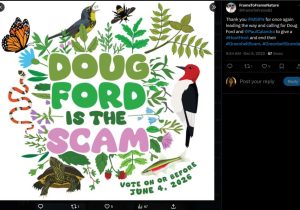
Appendix A
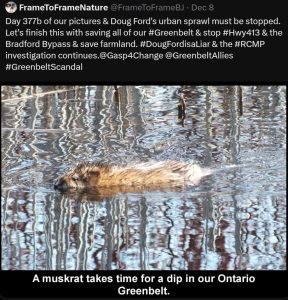
Appendix B

Appendix C
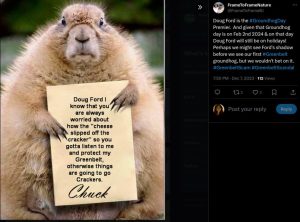
Appendix D

Appendix E
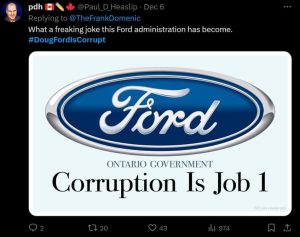
Appendix F
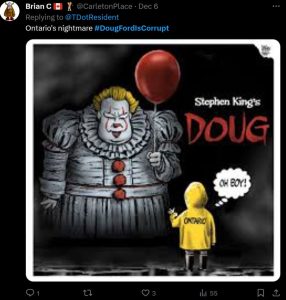
Appendix G
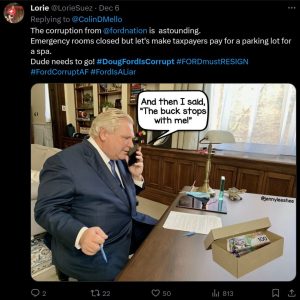
Appendix H
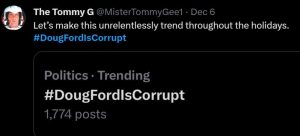
Appendix I
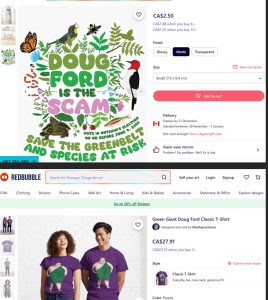
“Doug Ford is the Scam” Sticker for Sale by brendonstuff | Redbubble
“Green Giant Doug Ford” Classic T-Shirt for Sale by MacKaycartoons | Redbubble
Appendix J
Work Cited
Michalis Mamakos, Eli J Finkel, The social media discourse of engaged partisans is toxic even when politics are irrelevant, PNAS Nexus, Volume 2, Issue 10, October 2023, pgad325,
Zubernis, Lynn, and Katherine Larsen (2018) “Make Space for Us!Fandom in the Real World.” In A Companion to Media Fandom and Fan Studies (P. Booth, ed.) Hoboken, NJ: John Wiley & Sons Inc.,
West, Emily (2017) “Affect Theory and Advertising: A New Look at IMC, Spreadability, and Engagement.” in Explorations in Critical Studies of Advertising (James F. Hamilton et al., eds.) New York, NY: Routledge, p. 250\
Dean, Jodi (2015) “Affect and Drive”
Henrik Linden, S. L. (2016). Fans and Fan Cultures: Tourism, Consumerism and Social Media. Palgrave Macmillan UK. https://doi.org/10.1057/978-1-137-50129-5
Hermes, J. (2020). Tracing cultural citizenship online. Continuum (Minneapolis, Minn.), 34(3), 314–327. https://doi.org/10.1080/10304312.2020.1764776
Sandvoss, Cornel. (2019) “The Politics of Against: Political Participation, Anti-Fandom and Populism.” In Anti-Fandom: Dislike and Hate in the Digital Age, ed. Melissa Click, 125–146. NYU Press
Stanfill, M. (2020). Introduction: The Reactionary in the Fan and the Fan in the Reactionary. Television & New Media, 21(2), 123–134. https://doi.org/10.1177/1527476419879912
Linden and Linden, (2017) Fans And Fan Cultures,
Gray, Jonathan. “1. How Do I Dislike Thee? Let Me Count the Ways”. Anti-Fandom: Dislike and Hate in the Digital Age, edited by Melissa A. Click, New York, USA: New York University Press, 2019, pp. 25-41. https://doi.org/10.18574/nyu/9781479866625.003.0004
Dean, Johnathan (2017) “Politicising fandom.” The British Journal of Politics and International Relations, 19(2), 408–424.
Rodriguez, N. S., & Goretti, N. (2022). From Hoops to Hope: Alexandria Ocasio-Cortez and Political Fandom on Twitter. International Journal of Communication (Online), 16, 65-.

